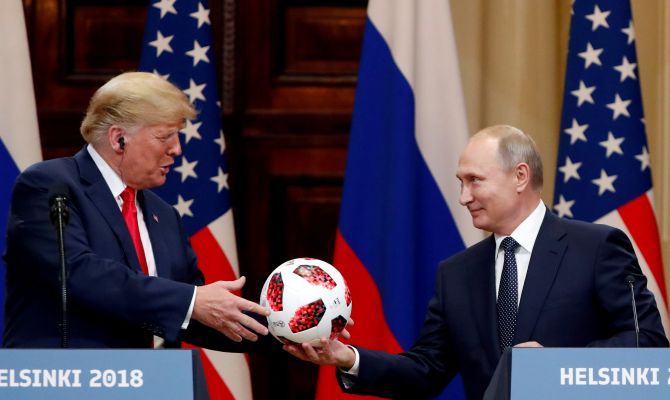In its sheer audacity, the initiative with Russia has the potential to transform world politics in the same way as Nixon's 1972 visit to China did, argues says Colonel Anil A Athale (retd).

After an unorthodox initiative with North Korea, Donald Trump has bowled another googly with his outreach to Russia's Vladimir Putin.
His Russian outreach is a logical step in the American policy of rebalancing to the East.
In the cacophony of criticism in the American media, his larger message has been lost.
The message is basically to Europe, that the US as a global power views Russia as a potential ally in facing the challenge of Islamist terror and the rise of China.
In its sheer audacity, the initiative with Russia has the potential to transform world politics in the same way as then US president Richard M Nixon's February 1972 visit to China and the Shanghai Declaration changed world dynamics.
Objectively speaking, Western criticism of Russia's annexation of Crimea does not ring fair.
Crimea was always a part of Russia and was administratively tagged onto Ukraine since Ukraine itself was part of Russia.
But such was the momentum of history that even the US tagged along with Europe in opposing the Russian action in Crimea.
The memories of Cold War rivalry with the erstwhile Soviet Union played a major part in anti-Russian attitudes in the US.
The Russia-Ukraine fight goes back nearly a century. In 1917, when the Bolshevik revolution took place in Russia, Ukraine sided with the Western powers and took part in the Russian civil war.
Even during World War II, a Ukrainian unit fought on the side of the Germans. Western intelligence agencies have been active for over a century in exploiting the Ukraine-Russia rivalry.
It is indeed a bit rich for Western countries to blame Russia solely for the violence in Ukraine.
NATO's aggressive eastwards expansion encroached on the Russian sphere of influence and it was to be expected that Russia would react.
But Western monopoly of the media discourse has been masking this reality.
Trump, by thinking out of the box, has obviously made concessions to legitimate Russian security interests.
In the media coverage of events of the 1990s, a major point was missed, that it was not merely the dissolution of the Soviet Union that happened but also the much older (nearly a hundred years old) Russian empire established by the czars collapsed at the same time.
The independence of various Central Asian Republics was part of that process.
The only exception to this rule was the far-eastern province of Siberia including the strategic port of Vladivostok.
The Russians have an extensive border with China along the Amur river, the Russian side extremely sparsely populated while the Chinese side teems with people.
In March 1969, the dispute over Damansky island erupted into armed clashes between China and Russia.
In the long term the Russians are mortally afraid and aware of potential Chinese territorial claims over their far east.
The current Russo-Chinese friendship is strictly a marriage of convenience, made possible because of European opposition to Russia.
Trump has astutely tapped the Russian unease and insecurity over this issue to woo Putin.
The US-Russia bonhomie augurs well for Indian interests.
This will make the Chinese more reasonable over the border issue and less prone to use the Pakistan proxy against India.
The Chinese would not like to open one more front, hemmed in as they are in the South China Sea by Japan and the US and in the north by Russia.
The Russia-America détente also resolves the Indian dilemma of arms imports from Russia as it is likely that the American sanctions on Russia, if not eased, are at least not likely to be made harsher.
In the bargain, one of the likely losers would be Iran.
Russia may well support America in curbing Iran's nuclear ambitions. Russia may also co-operate with the US on Syria. But these would be takeaways that Trump can flaunt to drum up support for his Russian outreach.
Whatever his domestic agenda, Trump has shown extraordinary boldness in the area of foreign policy by reaching out to North Korea and Russia.
Colonel Anil A Athale (retd) is a military historian and strategic analyst based in Pune and affiliated with the think-tank Inpad. He travelled extensively in Russia in 2015, including in Siberia and the Russian far east.









